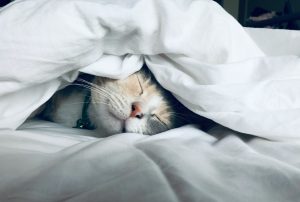 Everyone has their achilles’ heel—even the most successful or effective clinicians—and one of mine, as I’ve discussed before, is insomnia. On the bright side, mine is not constitutional—I never struggled with sleep as a child or adolescent. Unfortunately, this means by around 30 years old I had created it myself, whether through stress or unhealthy lifestyle, surely with a dash of genetic predisposition. My family tends to be more manic and wiry than sluggish or lethargic, the former of which lends itself to an overactive “yang,” or sympathetic nervous system.
Everyone has their achilles’ heel—even the most successful or effective clinicians—and one of mine, as I’ve discussed before, is insomnia. On the bright side, mine is not constitutional—I never struggled with sleep as a child or adolescent. Unfortunately, this means by around 30 years old I had created it myself, whether through stress or unhealthy lifestyle, surely with a dash of genetic predisposition. My family tends to be more manic and wiry than sluggish or lethargic, the former of which lends itself to an overactive “yang,” or sympathetic nervous system.
There are many disease patterns that might explain insomnia, but the top 3 are as follows:
- Blood deficiency: These people tend to be interrupted and/or have trouble staying asleep more than they do falling asleep. If they wake up and feel hot this might be the “blood deficient yang ming syndrome,” which requires heat-clearing in addition to blood nourishing.
- Ben Tun Syndrome: These people tend to have more trouble falling asleep, are subject to ruminating thoughts, anxiety, and heart palpitations. If there are no ruminating thoughts, and they’re just inexplicably lying there awake, good news: This might be the aforementioned “Yang Ming heat” stirring, more than sort of any anxiety condition.
- Food stagnation: These often wake in the middle of the night with stomach discomfort, reflux, or phlegm in the sinuses. They tend to benefit greatly from intermittent fasting, where they either skip dinner or eat it very early, around 5 or 6pm. They
In the past Chinese Medicine has intermittently helped with my own sleep issues, although there have been times where neither me nor my own herbalist/teacher have been able to crack the code. Much like a lawyer who represents themselves in court, it is challenging to write your own formula or treat one’s self. With acupuncture, beyond treating the overall pattern, I like to use points on the head, around the prefrontal cortex and pineal gland to modulate the neurological component of the issue.
I’ve used products like melatonin or Doc Parsley also with intermittent success, but obviously one should not be reliant on such supplements in perpetuity, especially since it is impossible to prescribe them holistically, tailored to the patient. They are symptom-managers, admittedly helpful during crises and less aggressive than pharmaceuticals, but still not ideal.
Beyond internal medicine, the best tools to maximize sleep are the obvious sleep hygiene and the breath. Melatonin secretion begins at 9pm and peaks at 10, so this is the best time to get in bed. If you can’t get to bed by 10, the earlier the better. Of course, sleep in a dark, relatively cool room, and spend the last two hours before bed with as little electronic (and digestive) stimulation as possible. If your sleep is interrupted use your breath to try and relax. This works for me about 80% of the time:
The 4-7-8 breath is one I learned from my wife, Dr. Jillian Cohen, and she learned it from Dr. Weill’s fellowship for Integrative Medicine.
Whenever that doesn’t work for me, I move on to this Kundalini yogic breath, defined by its silent mantra, which simply means saying it silently to yourself.
Finally, if that doesn’t work, I bring out the heavy artillery, which is to say God. You don’t have to be religious to believe in a higher power, and I imagine anyone who’s laid awake in bed struggling for several hours is willing to invoke whatever might be available to resolve the crisis. Using another silent mantra and breathing only through the nose I inhale: “I am God,” then exhale: “God is love.” This works almost all of the time, I think calming my central nervous system with the reassurance that no matter how poorly I sleep, no matter how difficult tomorrow is, I am ultimately connected to the source and none of this shit really matters. Hope that helps!


